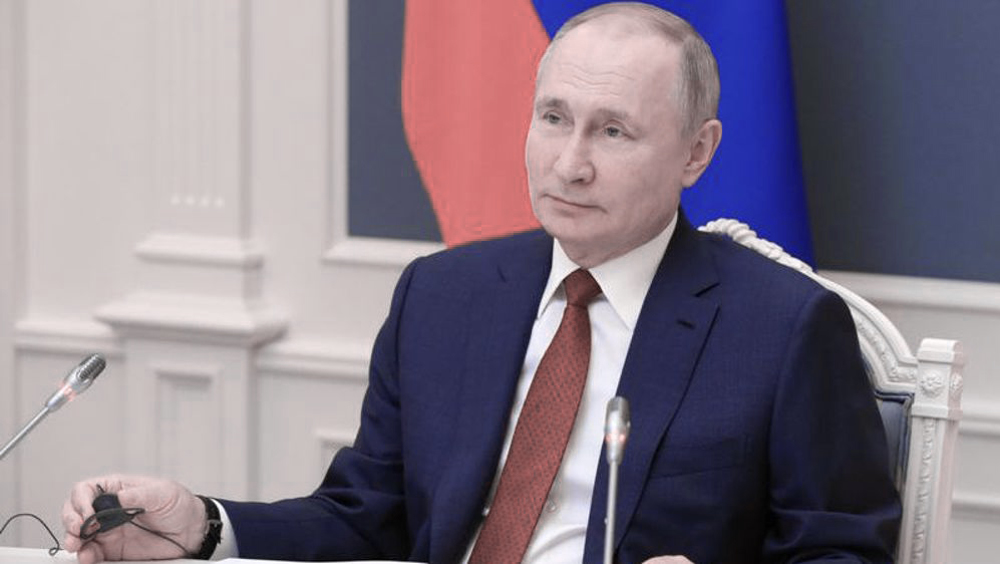World in status reminiscent of pre-World War II time, Putin warns
Russian President Vladimir Putin has warned against the same scenario that triggered international tensions leading to World War II.
The modern world’s current situation, Putin said on Wednesday, is one where you have “everyone against everyone,” and that resembles the time during the 1930s before the eruption of the world war.
“The scale and complex systemic nature of the challenges” in international relations pose similar threats, he said in an address to the World Economic Forum event, which is usually held in Davos, Switzerland, but it was virtual this year due to the coronavirus pandemic.
Existing economic models are causing a “sharp polarization” in views, the Russian president said, which leads to both populism and radicalism.
“International institutions are weakening, regional conflicts are multiplying, and the global security system is degrading.”
Putin’s participation in the forum marks his first appearance at the event since 2009, when he was prime minister.
Elsewhere in his remarks, the president hailed the extension of the New START treaty as a positive development in reducing global tensions. It is the last remaining nuclear arms agreement between Russia and the United States. “No doubt it is a step in the right direction.”
The situation, he highlighted, can still develop “unpredictably and uncontrollably if we sit on our hands.”
The Russian parliament’s lower house, the State Duma, has voted overwhelmingly in favor of extending START for five years. The upper house has also ratified it.
Putin submitted a bill with regard to the extension after a telephone conversation with President Joe Biden of the United States on Tuesday evening.
In July 1991, START, which later was called START I, was signed by then US President George H. W. Bush and Mikhail Gorbachev, the last president of the Soviet Union, barring both countries from deploying more than 6,000 nuclear warheads atop a total of 1,600 intercontinental ballistic missiles (ICBMs) and bombers.
In January 1993, President Bush and Boris Yeltsin, the former Russian president, signed START II, but it collapsed and never entered into effect.
START I expired in late 2009 and its replacement, called the New START or START III, was signed in April 2010 by former US President Barack Obama and then Russian President Dmitry Medvedev, under which both sides agreed to halve the number of strategic nuclear missiles and restrict the number of deployed strategic nuclear warheads to 1,550.
‘Major differences remain’
Kremlin spokesman Dmitry Peskov told reporters of the treaty issue that it was “a good timeframe, which will allow us to work well – if the political will exists – to either further extend it or (agree) a new text of the agreement.”
Peskov stressed that major differences remained between Moscow and Washington. “Of course so far there are no conditions for a reset.”
Putin urges Europe to ‘get rid of phobias’
In the forum, Putin said Russia was ready to improve relations between Moscow and the European Union in order for the two sides to return to a “positive agenda.”
“Of course, Western Europe and Russia should be together. Today’s situation is not normal.”
Putin also called on Europe to “get rid of the phobias of the past.”
Relations between Moscow and Brussels have been strained in recent years over a number of issues, the latest of which is the alleged poisoning of Russia’s opposition figure Alexei Navalny.
Western governments have been attacking Russia with accusations that it poisoned Navalny, saying Moscow must help investigate the case or face consequences.
The Russian government has denied the allegations.
VIDEO | Australians rally for Gaza ahead of Christmas festivities
VIDEO | Attacks on Sana'a
Iran reports further drop in annual inflation rate in December
Israel indicts two settlers over suspected spying for Hezbollah
Iran: US airstrikes on Yemen war crimes, violation of international law
Yemeni armed forces down F-18 fighter jet, repel US-UK attack: Spokesman
Iran warns against US-Israeli plot to weaken Muslims, dominate region
VIDEO | Public uproar in US against Israeli regime














 This makes it easy to access the Press TV website
This makes it easy to access the Press TV website